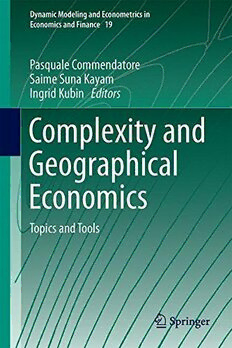Table Of ContentDynamic Modeling and Econometrics in
Economics and Finance 19
Pasquale Commendatore
Saime Kayam
Ingrid Kubin Editors
Complexity and
Geographical
Economics
Topics and Tools
Dynamic Modeling and Econometrics
in Economics and Finance
Volume 19
Editors
StefanMittnik
LudwigMaximillianUniversityMunich
Munich,Germany
WilliSemmler
BielefeldUniversity
Bielefeld,Germany
and
NewSchoolforSocialResearch
NewYork,USA
Moreinformationaboutthisseriesat
http://www.springer.com/series/5859
Pasquale Commendatore • Saime Kayam (cid:129)
Ingrid Kubin
Editors
Complexity and
Geographical Economics
Topics and Tools
123
Editors
PasqualeCommendatore SaimeKayam
DepartmentofLaw DepartmentofManagementEngineering
UniversityofNaples“FedericoII” IstanbulTechnicalUniversity
Naples,Italy Macka,Istanbul
Turkey
IngridKubin
DepartmentofEconomics
WUViennaUniversityofEconomicsand
Business
Vienna,Austria
ISSN1566-0419 ISSN2363-8370 (electronic)
DynamicModelingandEconometricsinEconomicsandFinance
ISBN978-3-319-12804-7 ISBN978-3-319-12805-4 (eBook)
DOI10.1007/978-3-319-12805-4
LibraryofCongressControlNumber:2015932772
SpringerChamHeidelbergNewYorkDordrechtLondon
©SpringerInternationalPublishingSwitzerland2015
Thisworkissubjecttocopyright.AllrightsarereservedbythePublisher,whetherthewholeorpartof
thematerialisconcerned,specificallytherightsoftranslation,reprinting,reuseofillustrations,recitation,
broadcasting,reproductiononmicrofilmsorinanyotherphysicalway,andtransmissionorinformation
storageandretrieval,electronicadaptation,computersoftware,orbysimilarordissimilarmethodology
nowknownorhereafterdeveloped.
Theuseofgeneraldescriptivenames,registerednames,trademarks,servicemarks,etc.inthispublication
doesnotimply,evenintheabsenceofaspecificstatement,thatsuchnamesareexemptfromtherelevant
protectivelawsandregulationsandthereforefreeforgeneraluse.
Thepublisher,theauthorsandtheeditorsaresafetoassumethattheadviceandinformationinthisbook
arebelievedtobetrueandaccurateatthedateofpublication.Neitherthepublishernortheauthorsor
theeditorsgiveawarranty,expressorimplied,withrespecttothematerialcontainedhereinorforany
errorsoromissionsthatmayhavebeenmade.
Printedonacid-freepaper
SpringerInternational PublishingAGSwitzerlandispartofSpringerScience+Business Media(www.
springer.com)
Preface
The uneven geographical distribution of economic activities is a huge worldwide
challenge. For the European Union (EU) regions, this is shown by the deep
differenceswithinandacrossnations.Spatialinequalitiesareevolvingthroughtime
followingcomplexpatternsdeterminedbyeconomic,geographical,institutionaland
socialfactors.TheNewEconomicGeographyapproach,whichwasinitiatedbyP.
Krugmanintheearly1990s,describeseconomicsystemsasverysimplifiedspatial
structures. Developing a more sophisticated modelling of the EU—visualized as
an evolving trade network with a specific topology determined by the number
and strength of national, regionaland local links—can provide economic policies
specificallydesignedtotakeintoaccountthispervasivenetworkstructureassessing
thepositionofbackwardlocationswithinthenetworkandfocussingoninstruments
thatfavourinterconnections.TheISCHCOSTActionIS1104“TheEUinthenew
complex geography of economic systems: models, tools and policy evaluation”
approvedby the EuropeanUnion in 2011and fundedfor the 4-yearperiod2012–
2016 is a network connecting more than 80 researchers in 25 Europeancountries
devoted to this task. The Action results are expected to provide a basis for an
improved evaluation of such policies, in particular for the European Cohesion
Policy,consideringtheirimpactonthewelfarelevelofEUcitizensanditsgeograph-
ical distribution. To achieve this objective, the Action enhances interdisciplinary
networking combining recent approaches in economics with the most advanced
mathematical, empirical and computational methods for analysing complex and
non-linearsystems.
Thisbook,whichismainlyacollectionofliteraturereviewsonrelevantaspects
of the Action, is put together to provide a basis for further analysis and as
an introduction into the complex network approach to the European Regional
Policy.Thebookconsistsofthreemainparts,i.e.economicgeographymodelling,
institutionsandmarkets,andsocialandindustrialinteractions.Eachoftheseparts
actually overlaps with separated but complementary lines of research followed
in understanding the interlinkages and interactions that emerge at different levels
involvingdifferentterritorialunits,institutionsandindividualagents.
v
vi Preface
The prospective readers are expected to be academicians and researchers who
demand new tools to pursue their investigations in the field. The contributors are
allexpertsoneithertopicsortoolsproposedto examineeconomicgeographyand
networksandaremembersofthe Action.Thecontributionsinthe presentvolume
werepresentedanddiscussedinanumberofworkshopsandconferencesorganized
withintheActionin2012and2013.
Naples,Italy P.Commendatore
Istanbul,Turkey S.Kayam
Vienna,Austria I.Kubin
Acknowledgements
We should first acknowledge the help of the organizersof Action workshops and
conferencesinUrbino(18–19September2012),Lisbon(25–28April2013),Naples
(3 May 2013), Madrid (20 May 2013) and Siena (4–6 July 2013). They have
provided the necessary environment for fruitful discussions for the experts and
membersoftheActionwithoutwhomneithertheconceptionnorthecontentsofthis
bookcouldhavebeenachieved.Likewise,wearealsogratefultothecontributorsfor
theirtimelyandpatientresponsestoourcommentsintheeditorialandproduction
processes.
Ourspecialthanksgototheexternalreferees,whonotonlyreviewedthechapters
allocated to them but also made significant contributionsto improvethe contents.
The editors are grateful to Raffaello Bronzini (Bank of Italy), Julie Le Gallo
(CRESE -UniversitédeFranche-Comté)andthe ActionmemberJose S. Cánovas
(PolitécnicadeCartagena)fordoinganexcellentandtimelyworkasreferees.
We are gratefulto the series editorsStefan Mittnik andWilli Semmler,and we
wouldliketogiveourappreciationtoMartinaBihn,RuthMilewski,YuliyaZehand
VenkatachalamAnand fromSpringerfor their patientand constructiveattendance
duringtheeditorialprocess.
vii
Contents
Introduction ...................................................................... 1
PasqualeCommendatore,SaimeKayam,andIngridKubin
PartI EconomicGeographyModelling
Towards a MultiregionalNEG Framework: Comparing
AlternativeModellingStrategies............................................... 13
PasqualeCommendatore,ValerioFiloso,
TheresaGrafeneder-Weissteiner,andIngridKubin
ParametricModelsinSpatialEconometrics:ASurvey ..................... 51
DianaA.MendesandVivaldoM.Mendes
SemiparametricSpatialAutoregressiveGeoadditiveModels............... 73
RobertoBasile, Saime Kayam,RománMínguez,Jose María
Montero,andJesúsMur
DiffusionofGrowthandCyclesinContinuousTimeandSpace ........... 99
TönuPuu
PartII InstitutionsandMarkets
ComplexFinancialNetworksandSystemicRisk:AReview................ 115
SpirosBougheasandAlanKirman
MigrationandNetworks ........................................................ 141
DouglasR.Nelson
TheResponseofGermanEstablishmentstothe2008–2009
EconomicCrisis .................................................................. 165
LutzBellmann,Hans-DieterGerner,andRichardUpward
ix

